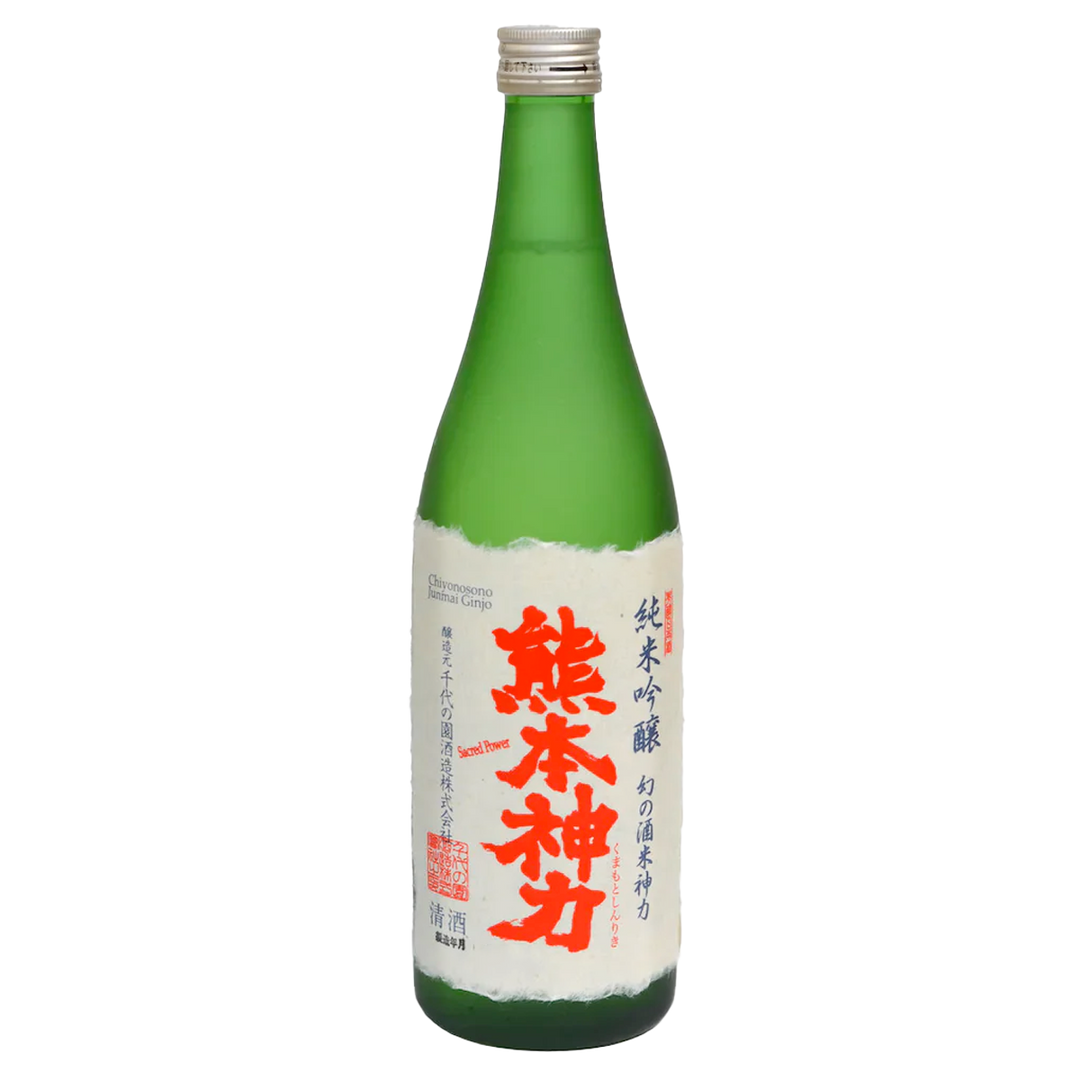
Chiyonosono Junmai Ginjo "Sacred Power"
- In stock, ready to ship
Chiyonosono Junmai Ginjo has this gorgeous texture when chilled, that strikes me as utterly unique-- fuzzy, velveteen, smooth-- with flavors dialed in to perfect balance and clarity. Kombu dashi, velvety soft anjou pear, hay, chamomile, and salty sea spray.
"Sacred Power," a direct translation of shinriki, is made with 100% Shinriki rice. Shinriki is a old rice variety native to Honshu and very difficult to grow. It grows about 3x the height of standard crossbreeding rice. To grow it requires a lot of skill and patience. As a result Shinriki was long thought lost to time, falling out of cultivation for decades. The family's history with Shinriki encouraged them to bring it back: a distant relative of Chiyonosono in the late 1800s helped develop the sake-brewing strain of Shinriki that is used today.
So it’s very difficult to grow— it’s hard to find farmers willing to grow it. And it needs to be personally certified by a representative from the government every year to be an official sake rice for Kumamoto prefecture. Someone has to take a plane from Tokyo, drive out to the fields, and physically certify the rice every time. It’s a huge pain, so Chiyonosono tried to ask the importer if they could change the rice up a bit, or maybe use a blend of rice to make this product. However, the importer Kome Collective would not accept this and insisted on 100% Kumamoto shinriki rice. As a result, the Sacred Power we get is ONLY exported to the US— the Japanese version is a blend! If you visit the brewery, you can’t even try this 100% Shinriki sake. It's a US exclusive, and it sure is fantastic!
Brewery: Chiyonosono
Japanese name: 千代の園酒造
Established: 1896
Prefecture: Kumamoto
Rice: Shinriki (local, 100%)
Polish: 55%
Starter method: Sokujo
Yeast: Kumamoto (related to 901)
Brewery website: https://www.chiyonosono.co.jp/
Kumamoto is really shochu (distillate) country and the brewery also makes shochu, of course. But the roots of the Honda family are as prominent rice wholesalers and that really governs their approach to production as well as their commitments. In 1896, the family started a sake brewery to add value to their rice and because during this period the Meiji government was offering strong incentives to begin sake production (sake tax was funding modernization and wars after all). It was around this time that the original owner Honda Kikuhachi also directed rice breeding trials which led to the development of Kyushu Shinriki, a sake brewing rice with high starch content.
During WW2 there were extreme rice shortages. There was more potatoes than rice eaten during this time— so getting rice to make sake with was very difficult. As a result all brewers were required to make sanzoshu, highly diluted sake— only about a third of the liquid was the original sake. The rest was added alcohol, water, and artificial flavorings, sweeteners. After the war, when brewers once again regained access to rice most people had forgotten about junmai (pure rice sake) and believed it was stupid or uneconomical to resume junmai production. But Chiyonosono believed it was a worthwhile effort to make: they were committed to the integrity and purity of rice and its products.
In 1968, Chiyonosono went on record as one of the first breweries to produce Junmai (at around this time, 1967 in Saitama and 1964 in Kyoto, other early adopters were also making moves). At Chiyonosono, the brewery workers made a pact: sharing sake from a red ritual sake cup, a shuhai, to continue working to improve the quality of sake in Japan. Thus the Junmai brand was named “shuhai” (English translation, ”shared promise”) in honor of this pact. As a former rice wholesaler and junmai specialist, Chiyonosono specializes in rice cultivation and their unique access to heirloom strains and brews lets them design sake with distinctive rice textures and aromas.
The brewery is located on the southernmost island of Kyushu—the gateway into Japan—known for Asian and European cuisine, historic architecture, and distinct regional culture. The future 5th generation president and daughter of the current brewery president, Yuri Honda, is already making a name for herself as an innovator in the sake community and is primed to continue pushing the brewery toward forward-thinking yet approachable sake.
During her visit to Sunflower, Ms. Honda was asked about her experience being a woman and being expected to take over the brewery in a male-dominated industry. Her feeling is that because it’s so unusual being a woman she is used to things being unusual, her fresh set of eyes is very individual, and this gives her an advantage in a changing market. She’s less likey to just go with the flow and accept things as they are. In turn she gets less pushback when making changes because her mere presence is already different.
Sacred Power has a maritime smokiness and kombu seaweed quality, which makes it perfectly suited to kombu-cured sashimi, which can take on a texture like velvet. This particular sake also has that rich velvety texture, making for an excellent pairing. Sweet-tasting seafood (scallops, shrimp, lobster, crab) meld with Sacred Power perfectly, or choose a slightly-sweet vegetarian dish such as carrot soup, parsnip puree, corn kakiage, or chestnut ravioli with brown butter.

